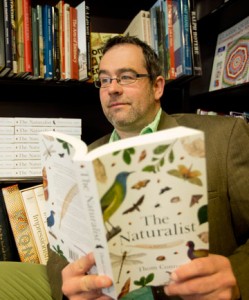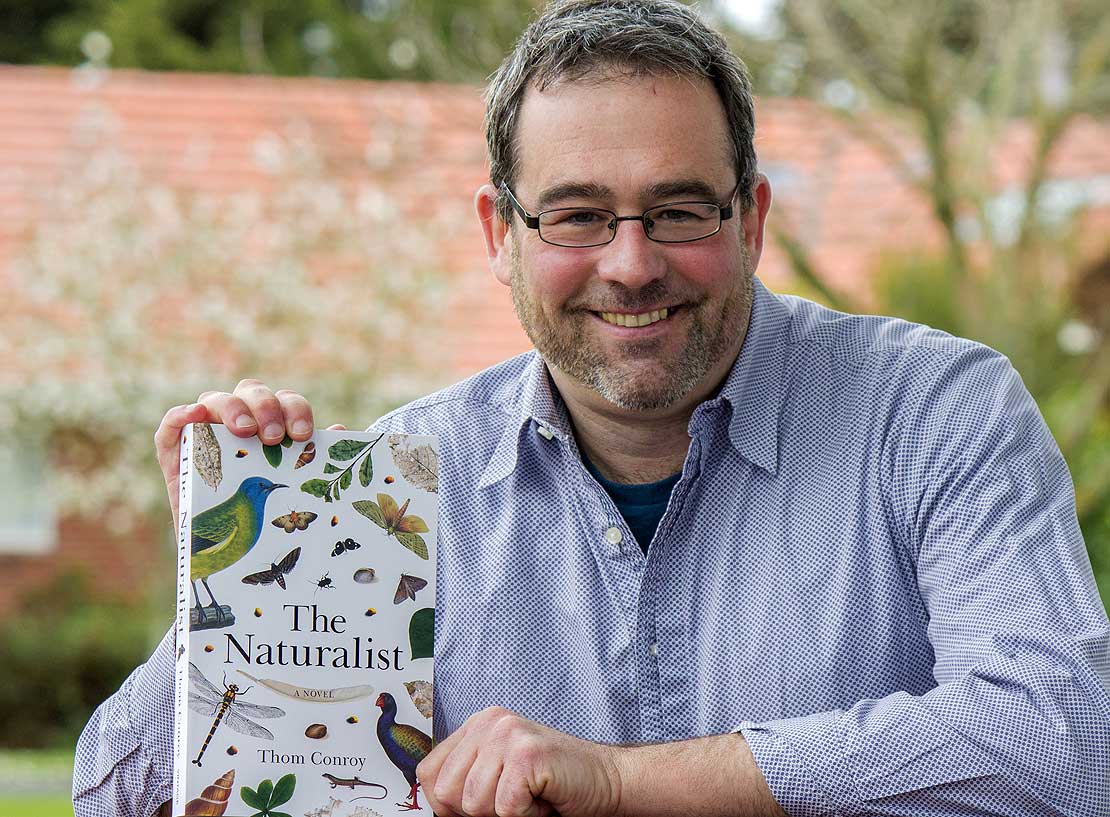Massey Senior Lecturer Thom Conroy’s historical novel is reviewed on Afternoons by Mary McCallum: http://www.radionz.co.nz/national/programmes/afternoons/audio/20157707/book-review-with-mary-mccallum.
Tag Archives: thom conroy
Another wonderful review for The Naturalist
 More high praise for Thom Conroy’s best-seller The Naturalist – see the Booksellers’ blog at https://booksellersnz.wordpress.com/2014/09/18/book-review-the-naturalist-by-thom-conroy/
More high praise for Thom Conroy’s best-seller The Naturalist – see the Booksellers’ blog at https://booksellersnz.wordpress.com/2014/09/18/book-review-the-naturalist-by-thom-conroy/

The Naturalist Book Launch

Friday 15th August saw the launch of a Massey University creative writing senior lecturer Thom Conroy’s novel the Naturalist at Palmerston North City Library, with over 150 people in attendance. The book launch featured a reading from Dr Conroy, and introductions from the Head of the School of English and Media Studies Joe Grixti and well known poet Helen Lehndorf. The book is currently at number two on the New Zealand fiction bestseller list.
The Naturalist tells the tale of Dr Ernst Dieffenbach – a liberal-minded, free-spirited 19th century German physican, geologist and naturalist who studied New Zealand’s wildlife, plants and people, was fluent in Māori and considered all races to be equal – was a man ahead of his time.
His views seem more in line with contemporary thinking on issues such as race relations and democracy, which is partly what fascinated Dr Thom Conroy. The result is his first, just-published novel The Naturalist (Penguin Random House Books).
Dr Conroy says he was struck by what he read about Dieffenbach while researching natural history for another project. He felt the German deserved more attention in light of his colourful personality and experiences at the onset of New Zealand’s colonisation.
Expelled from Germany for supporting a subversive pro-democracy revolutionary student movement and for duelling, Dieffenbach wound up in London and was appointed as naturalist aboard the controversial 1839 expedition of the Tory.
His ship mates included Colonel William and his nephew Jerningham Wakefield of the New Zealand Company, who were off to buy land from Māori for British settlers without the consent of the Crown. Charles Heaphy, artist and draughstman for the New Zealand Company, was aboard too.
Dieffenbach had strong views on colonisation, which clashed with orthodox views at the time and made for heated debate during the gruelling three-month voyage. Also on board was Nahiti, a young Māori returning home from London having left New Zealand on a whaling ship. His friendship with the German naturalist confirmed Dieffenbach’s conviction that humans were equal, whatever their skin colour.
While he may be known to a few historians through his two volume narrative Travels in New Zealand, Dr Conroy says Dieffenbach has been overlooked. “The more I read about him, the more I felt he needed to be rescued from the margins of history.”
He includes a striking quote at the opening of the book from the second volume of Dieffenbach’s Travels in New Zealand: “I am of the opinion that man, in his desires, passions, and intellectual faculties, is the same, whatever be the colour of his skin; that mankind forms a great whole, in which the different races are the radii from a common centre; and that the differences which we observe are due to particular circumstances which have developed certain qualities of body and mind.”
Such views were unusually enlightened for his time, and in contrast to those of the theory of evolution founder Charles Darwin, who makes a cameo appearance in the novel. He believed Māori were of a “lower order”.
The novel focuses on Dieffenbach’s 18-month stay in New Zealand, weaving a compelling narrative around his discoveries, explorations – he was the first European to ascend Mt Taranaki – and encounters with land, nature and people. The story vividly evokes the extraodinary pioneering sea voyage into unknown territory, and spans the Northern and Southern hemispheres to encompass his personal life and love interests in Germany, London and New Zealand.
American-born Pennsylvanian Dr Conroy, who has lived in New Zealand for nine years, drew on extensive historical records and research for the book, inventing scenes and additional minor characters to bring the German’s remarkable personality and story to life.
He hopes his fictional rendition of Dieffenbach’s story will have wide appeal – especially to those intrigued by influential yet marginalised historical figures who provide fresh clues to the tangents and nuances of New Zealand’s colonial history.
Balancing the tension between fact and fiction to produce a compelling and authentic story was one of the main creative challenges of the book, which he completed after more than 30 drafts, he says.
But such literary challenges have a positive spin-off. Discussing them enlivens his creative writing classes and supervision of Master of Creative Writing students. “When I’m sitting in a class or workshop discussing work with students, we’re there as people, as writers. We understand what we each are going through and can learn from each other.”
Dr Conroy’s short fiction has appeared in various journals in the US and New Zealand, including Landfall, Sport, New England Review, Alaska Quarterly Review, and Kenyon Review. He has won the Katherine Anne Porter Prize in Fiction and his writing has been recognised by Best American Short Stories 2012 as well as the Sunday Star-Times Short Fiction Competition.
He and his School of English and Media Studies colleague Dr Tina Dahlberg, who publishes under the name of Tina Makereti and also teaches creative writing papers at Massey’s Manawatū campus, are two of only only three new literary fiction writers in New Zealand to be published by Penguin Random House Books this year. Dr Dahlberg’s novel Where the Rekohu Bone Sings, was published in March. </P.
Professing Creativity: Creative Writers and Teachers Network
This Radio New Zealand ‘Standing Room Only’ broadcast aired in February 2014. Framed by the Professing Creativity conference: http://www.massey.ac.nz/massey/learning/departments/school-english-media-studies/about/events/professing-creativity-conference/professing-creativity-conference_home.cfm , the episode is centred on creative writing and it mentions Massey several times about how creative writing is offered ‘on all three campuses’ of Massey and it features interviews with conference keynotes Michele Leggott and Kevin Brophy: http://www.radionz.co.nz/audio/player/2585902
Professing Creativity: Teaching Creative Writing in Aotearoa Conference
Professing Creativity: Teaching Creative Writing in Aotearoa
Dates: Wednesday 12 February– Friday 14 February 2014
Venue: Massey University, Wellington Campus
Call for papers
What is the state of teaching Creative Writing in New Zealand? What standards do we share? Where is the discipline headed and what are we doing about it?
This conference will serve as an initial discussion about some of the foundational issues around our diverse and emerging discipline in Aotearoa. Is it diverse, for instance? Is it a discipline? Is it emerging? Arising out of issues around expectations for creative theses, the conference has a special focus on postgraduate issues in Creative Writing. Professing Creativity will also feature a panel discussion on creative writing, which will join national and international teachers in a dialogue around some of the big issues in the field.
By 15 November, 2013 submit a 300 word abstract related to the following themes:
Purpose of the profession: what is creative writing in New Zealand today? What will it be tomorrow?
Marrying creative & critical: What is a creative-critical thesis? What expectations do we have as supervisors and examiners?
Biculturalism in the Classroom: How do issues of Maori identity and access shape our teaching? What changes are needed?
Writing in the Tower: In what ways does creative writing as postgraduate research differ from creative writing outside of the academy?
Doctor of What: What is the creative PhD and what should it be? What issues do we face in the moderation and examination of creative work? What distinguishes the creative PhD from the Masters?
Playing it Loose: What role do theatre and media script writing have in Creative Writing?
Where in the World: How does teaching in New Zealand fit into an international context?
Key Note Speakers
Joan Connor, University of Ohio
Michele Leggott, University of Auckland
Kevin Brophy, University of Melbourne
Angie Farrow, Massey University
Panel Chair: Damien Wilkins, International Institute of Modern Letters
Registration Costs
Standard conference registration: $60
Student registration: $25
Visitor day rate: $30
An additional fee will apply for those who’d like to attend the conference dinner.
Online registration details will be available from 1 December.
Creative Writing Consortium
The Professing Creativity Conference is also intended as the kick-off for an ongoing consortium of creative writing teachers intended to keep the discussion active and assist us with such practical issues as finding examiners for postgraduate work. If you’re unable to attend the conference but would like to be involved in the consortium, please contact Nicholas Allen (nicholas.peter.allen@gmail.com) and let him know.
Key Dates
15 November, 2013: Abstracts due
1 December, 2013: Online Conference registration open (early bird rates apply)
26 January, 2014: Online Conference registration closes (additional registration available during the conference)
12 February – 14 February: Professing Creativity Conference
Contact
Please send abstracts and general enquiries to Conference Coordinator, Nicholas Allen, at nicholas.peter.allen@gmail.com
Professing Creativity Conference Committee
| Thom Conroy | Jack Ross |
| Angie Farrow | Bryan Walpert |
| Joy GreenClaire Grant | Tina MakeretiJulie McKenzie |